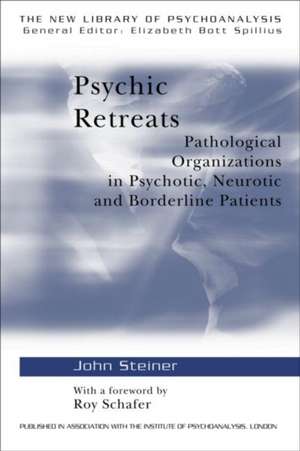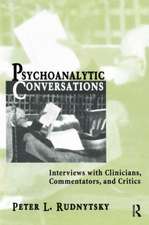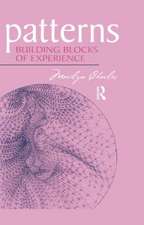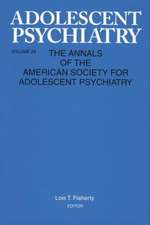Psychic Retreats: Pathological Organizations in Psychotic, Neurotic and Borderline Patients: The New Library of Psychoanalysis
Autor John Steineren Limba Engleză Paperback – 2 dec 1993
"Psychic Retreats" is written with practicing psychoanalysts and psychoanalytic psychotherapists in mind, the emphasis is therefore clinical throughout the book, which concludes with a chapter on the technical problems which arise in the treatment of such severely ill patients.
Din seria The New Library of Psychoanalysis
- 5%
 Preț: 293.44 lei
Preț: 293.44 lei - 5%
 Preț: 266.39 lei
Preț: 266.39 lei - 5%
 Preț: 264.13 lei
Preț: 264.13 lei - 5%
 Preț: 295.02 lei
Preț: 295.02 lei - 5%
 Preț: 298.13 lei
Preț: 298.13 lei - 5%
 Preț: 259.64 lei
Preț: 259.64 lei - 5%
 Preț: 294.02 lei
Preț: 294.02 lei - 5%
 Preț: 231.83 lei
Preț: 231.83 lei - 5%
 Preț: 349.43 lei
Preț: 349.43 lei - 5%
 Preț: 273.05 lei
Preț: 273.05 lei -
 Preț: 295.41 lei
Preț: 295.41 lei - 5%
 Preț: 289.20 lei
Preț: 289.20 lei -
 Preț: 347.68 lei
Preț: 347.68 lei - 5%
 Preț: 373.84 lei
Preț: 373.84 lei - 5%
 Preț: 296.08 lei
Preț: 296.08 lei - 5%
 Preț: 235.05 lei
Preț: 235.05 lei - 5%
 Preț: 234.37 lei
Preț: 234.37 lei - 5%
 Preț: 253.71 lei
Preț: 253.71 lei - 5%
 Preț: 233.66 lei
Preț: 233.66 lei - 5%
 Preț: 295.41 lei
Preț: 295.41 lei - 5%
 Preț: 316.86 lei
Preț: 316.86 lei -
 Preț: 309.79 lei
Preț: 309.79 lei - 5%
 Preț: 282.41 lei
Preț: 282.41 lei - 5%
 Preț: 294.71 lei
Preț: 294.71 lei - 5%
 Preț: 287.55 lei
Preț: 287.55 lei - 5%
 Preț: 280.60 lei
Preț: 280.60 lei - 5%
 Preț: 250.75 lei
Preț: 250.75 lei -
 Preț: 336.85 lei
Preț: 336.85 lei - 5%
 Preț: 286.71 lei
Preț: 286.71 lei - 5%
 Preț: 333.70 lei
Preț: 333.70 lei - 5%
 Preț: 762.86 lei
Preț: 762.86 lei - 5%
 Preț: 259.78 lei
Preț: 259.78 lei - 5%
 Preț: 233.06 lei
Preț: 233.06 lei - 5%
 Preț: 233.60 lei
Preț: 233.60 lei - 5%
 Preț: 218.59 lei
Preț: 218.59 lei - 5%
 Preț: 219.54 lei
Preț: 219.54 lei - 5%
 Preț: 331.66 lei
Preț: 331.66 lei - 5%
 Preț: 344.75 lei
Preț: 344.75 lei - 5%
 Preț: 295.21 lei
Preț: 295.21 lei - 5%
 Preț: 287.95 lei
Preț: 287.95 lei - 21%
 Preț: 811.99 lei
Preț: 811.99 lei - 19%
 Preț: 246.34 lei
Preț: 246.34 lei - 5%
 Preț: 362.47 lei
Preț: 362.47 lei - 5%
 Preț: 367.79 lei
Preț: 367.79 lei - 11%
 Preț: 278.48 lei
Preț: 278.48 lei - 5%
 Preț: 365.37 lei
Preț: 365.37 lei - 5%
 Preț: 363.52 lei
Preț: 363.52 lei - 5%
 Preț: 382.02 lei
Preț: 382.02 lei
Preț: 294.24 lei
Nou
56.30€ • 60.21$ • 46.94£
Carte disponibilă
Livrare economică 27 martie-10 aprilie
Livrare express 12-18 martie pentru 25.01 lei
Specificații
ISBN-10: 0415099242
Pagini: 176
Ilustrații: black & white illustrations
Dimensiuni: 156 x 234 x 13 mm
Greutate: 0.25 kg
Ediția:1
Editura: Taylor & Francis
Colecția Routledge
Seria The New Library of Psychoanalysis
Locul publicării:Oxford, United Kingdom
Public țintă
Professional Practice & DevelopmentCuprins
A Theory of Psychic Retreats. Psychic Retreats. The Paranoid-schizoid and Depressive Positions. Review: Narcissistic Object Relations and Pathological Organisations of the Personality. The Recovery of Parts of the Self Lost Through Projective Identification: The Role of Mourning. The Retreat to a Delusional World: Psychotic Organisations of the Personality. Pathological Organisations as a Defence Against Depressive Pain and Guilt. The Relationship to Reality in Psychic Retreats. Perverse Relationships in Pathological Organisation. Two Types of Pathological in Oedipus the King and Oedipus at Colonus. Problems of Psychoanalytic Technique: Patient-centred and Analyst-centred Interpretations
Notă biografică
John Steiner is a member of the British Psycho-Analytical Society and a Consultant Psychotherapist at the Tavistock Clinic, London.
Recenzii
"This is a very clearly and concisely written book about patients who are very difficult to reach. Its great strength lies in the way that Steiner convincingly brings together detailed clinical description and the theoretical concepts informing his work ... I wholeheartedly recommend it to a wide readership." - Chris Mawson
Descriere
Essentially clinical in its approach, Psychic Retreats discusses the problem of patients who are 'stuck' and with whom it is difficult to make meaningful contact. John Steiner, an experienced psychoanalyst, uses new developments in Kleinian theory to explain how this happens.
He examines the way object relationships and defences can be organized into complex structures which lead to a personality and an analysis becoming rigid and stuck, with little opportunity for development or change. These systems of defences are pathological organisations of the personality: John Steiner describes them as 'psychic retreats', into which the patient can withdraw to avoid contact both with the analyst and with reality.
To provide a background to these original and controversial concepts, the author builds on more established ideas such as Klein's distinction between the paranoid-schizoid and depressive positions, and briefly reviews previous work on pathological organizations of the personality. He illustrates his discussion with detailed clinical material, with examples of the way psychic retreats operate to provide a respite from both paranoid-schizoid and depressive anxieties. He looks at the way such organizations function as a defence against unbearable guilt and describes the mechanism by which fragmentation of the personality can be reversed so the lost parts of the self can be regained and reintegrated in to the personality.
Psychic Retreats is written with the practising psychoanalysts and psychoanalytic psychotherapists in mind. The emphasis is therefore clinical throughout the book, which concludes with a chapter on the technical problems which arise in the treatment of such severely ill patients.























